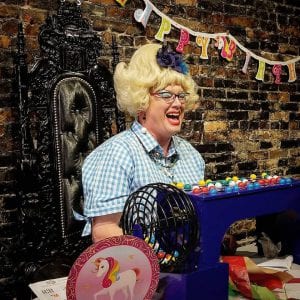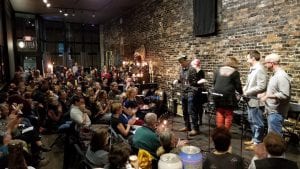Local Small Business Spotlight: Risa Blythe, Proprietor of Girlie Press
Numerous articles and studies have been published citing the critical role that small businesses play in the vitality of cities and towns of all sizes. For example, small businesses help foster community, add to the unique character of a place, provide distinctive opportunities for entrepreneurism, and contribute to economic health. Beyond these significant contributions, there is also an important relationship between small businesses and historic neighborhoods and old buildings. In short, preservation relies on small businesses, and small businesses often rely on historic spaces — a relationship you can read more about in this recently published article by the Washington Trust for Historic Preservation.
Girlie Press is a woman-owned small business located in an adaptive reuse space in the Capitol Hill neighborhood. Read on to hear what the print shop’s proprietor, Risa Blythe, has to say about owning small business, preservation, and more:
After eight years and only two other jobs as an offset press operator, Girlie Press was originally founded in 1995 in the back of a building in Belltown and then moved into a historic Anne Michelson building on 10th Avenue. “I shared a space as an offset printer with BSK, a screen-printing company that did much of the printing for Sub Pop and the grunge music scene. That was fun and insane, and I worked, and worked, and I put money away,” said Risa.
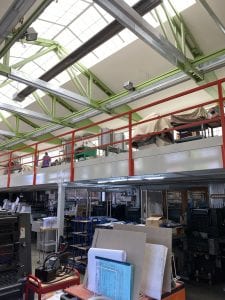
Inside Girlie Press
In 2000, when Risa acquired the building where Girlie Press is now located, it had been subleased to a stone cutting artist and sculptor who essentially fled in the middle of the night – leaving behind a warehouse full of massive, heavy, stone cutting equipment. “One of the companies I did a lot of work for was the Seattle Men’s Choir. Doug Exworthy was on the choir and owned the rights to the building where the shop is now. He knew I did a lot of work for the queer community, and he contacted me and said, ‘you need your own building.’ He became my mentor, guiding me through the whole process. It was adventurous, but I pulled it off! This was back in the day when you could put on a suit and go into a bank and talk things through…with people,” Risa explained.
All of the items left behind were sold off to put money back into the building and to make way for printing equipment. With her penchant and passion for machinery, Risa was just the woman for the task. Her keenness for mechanics, a trait she recalls recognizing early in life, has continued to prove valuable throughout her career. For example, when it came to acquiring her own 10,000-pound press, she was able to purchase a broken machine for a low price and repair it herself.
“I remember at one point, I applied to be a certified woman-owned business,” explained Risa. “A guy called me to ask for clarification about some parts of my application, and he just couldn’t seem to comprehend that a woman was capable of fixing a machine like this! That he believed that this was beyond my…realm, that’s when I knew why it was important to get the certification. There aren’t a lot of women in print, but I grew up in a feminist, entrepreneurial household and I’m thick-skinned. So, I have been able to shoulder discrimination I’ve encountered in the field. I started my own business because I wanted to work with people who had a sense of humor and didn’t mind working for a woman in a male-dominated field. Nobody — no guy — who’s got a lot of issues can work here and go home at the end of the day and say, ‘yeah, I work at Girlie Press!’”
When asked if she considers herself a preservationist, Risa made a surprising connection between her love of machinery and historic preservation. “The part of me that is a preservationist is that I really like a well-built machine. I really like function. Newer things are more disposable, they are meant to have an end of life, whereas with an older machine its gearbox can be rebuilt again and again and its function is to last long term. I also like new things that are super fancy and have lots of bells and whistles, but I like them to be built on an older mechanical premise,” said Risa.
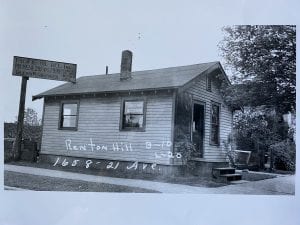
This historic assessor’s photo shows a building which formerly stood on the site where Girlie Press is now located.
Risa enjoys the location of her current shop at 1658 21st Avenue. While she is attracted to industrial and gritty places like Georgetown (one of her favorite places in Seattle), she appreciates that the shop is not in a strictly industrial area, but is instead nestled within a neighborhood with a commercial and residential mix. “There’s a German philosopher — someone who I can’t recall — who presented the idea that something went wrong when people started working in places that were far away from where they lived. It allows for more tolerable levels of pollution, longer workdays, and less family interaction. I live less than a mile away in Madrona, in a simple 1902 Victorian. Another favorite place is my backyard because my wife is such a great gardener! And I like that I can work in a trade, but still work in an area where people are living too,” said Risa.
The community is very important to Risa. In addition to the long list of organizations Girlie Press supports, she uses her business to promote causes she cares about: “There aren’t a lot of print shops that care about the same things I care about so I have a unique opportunity to use what I do, and do well, to support those things. I like the idea of using the power of the press to help organizations make money or do good things. We’ve printed over 1,000 posters since the most recent events of the Black Lives Matter movement have been unfolding. A lot of times people will ask us to print something for them and we’ll ask, ‘Do you want us to print a bunch more of these and just give them out?’ It’s cool to be part of this ancient history of activism through art.”
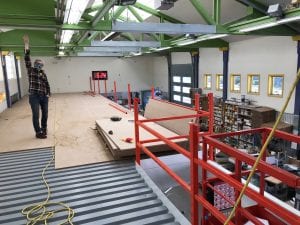
Risa in the shop’s new mezzanine space
Lately, the effects of the pandemic have been felt at Girlie Press. At one point, Risa sheltered at the shop and ran the whole press herself in order to execute print jobs (including Historic Seattle’s emergency appeal) for grocery stores and other essential businesses. Many of her staff have recently returned to the shop after many weeks working remotely. Upon their return, staff were able to spread out further, occupying space in the mezzanine that was fortunately recently built in the warehouse.
In the previously referenced Washington Trust for Historic Preservation article, Breanne Durham wrote, “There has never been a more poignant time to reflect on the value small businesses have in our lives and in our work. The onslaught of COVID-19 has taken our local economies by storm…Small businesses employ about half of the private workforce in the United States. And without them, our historic commercial districts lack the activity and commerce that creates healthy, socially cohesive, and economically viable communities. If the preservation field is looking for its place within the COVID-19 crisis, here it is.”
Looking for other ways to support small businesses? Intentionalist.com allows you to search for Asian-owned, Black-owned, disability-owned, family-owned, Latino-owned, LGBTQ-owned, Native-owned, veteran-owned, and woman-owned businesses and social enterprises in select cities, including Seattle.
